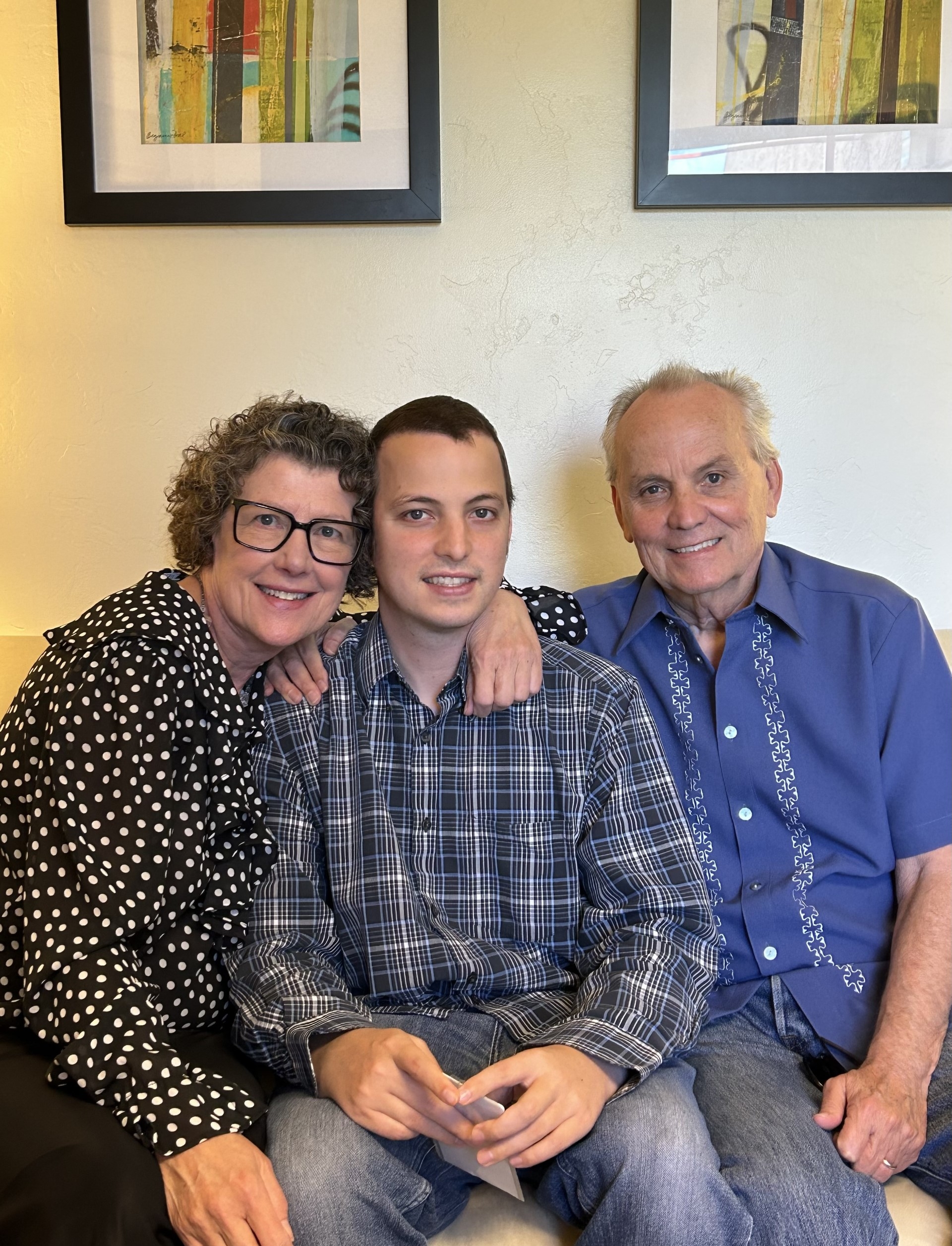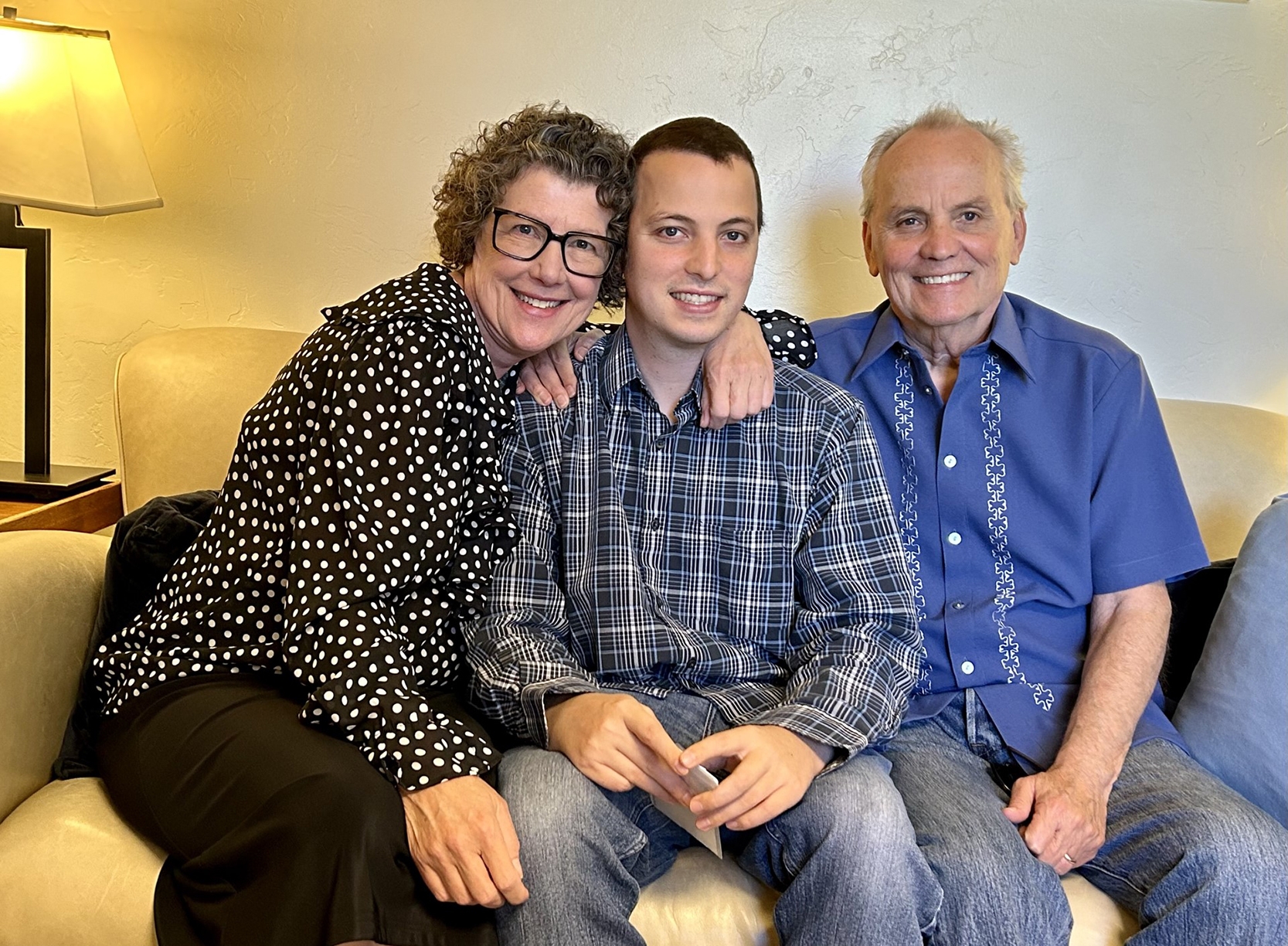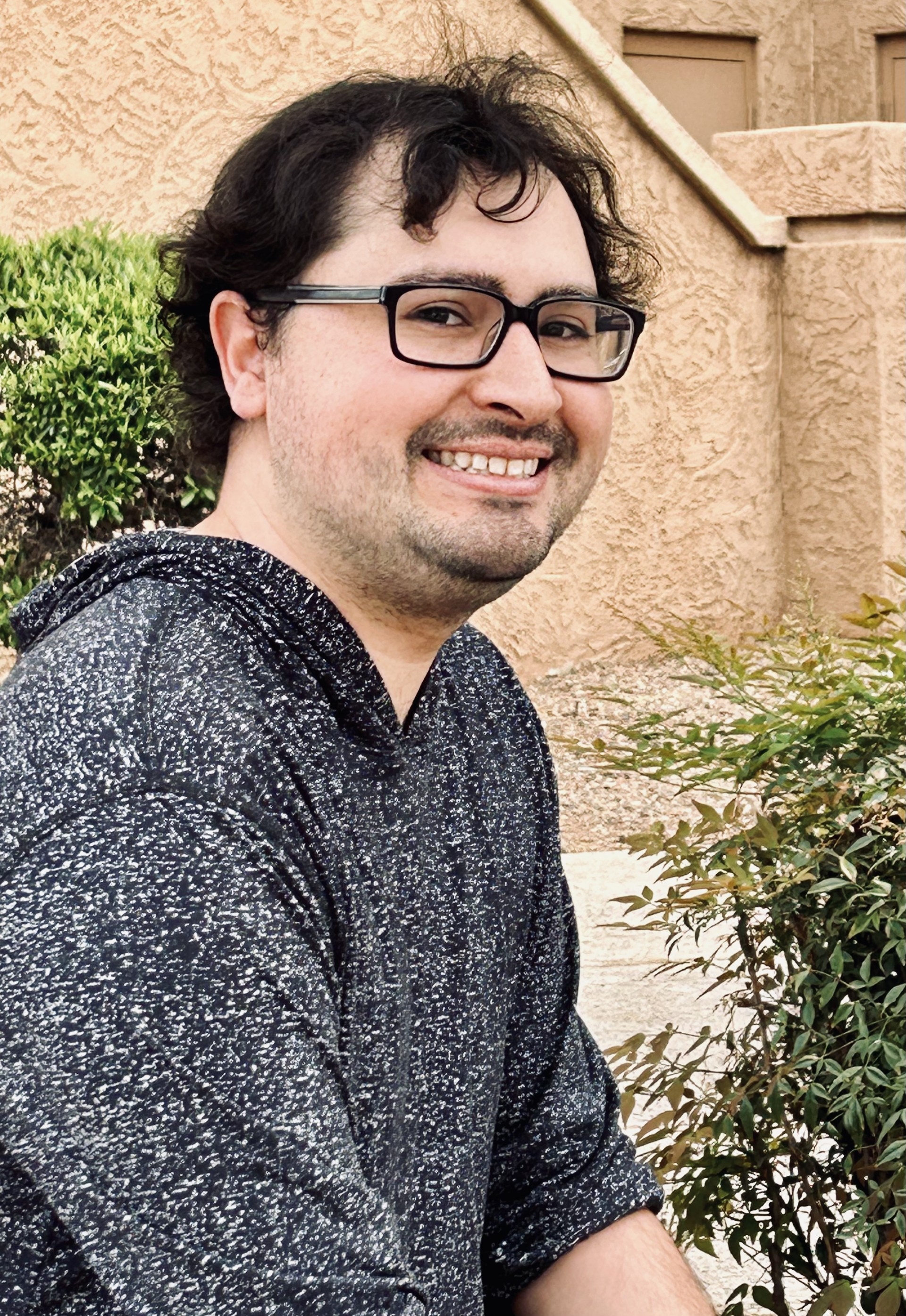
Read the stories of previous members and their journey with mental health.
Meet the Parents with Andrew Moore
Meet the Parents
A conversation with EPICenter Peer Support Specialist Andrew Moore, and his parents Mona and Lew Moore.
 December, 2023 -- Andrew Moore joined the EPICenter team in May 2023 as our first Peer Support Specialist. Previously, Andrew was an EPICenter member. Six months into his job, I invited his parents, Mona and Lew Moore, to talk about their experience supporting Andrew - from the first signs of psychosis as a teenager to the present. This is a transcript of the interview with minor edits for style, length, and clarity. Andrew and his parents read the transcript and gave us permission to share with our community in our website. Our deep gratitude to Mona, Lew and Andrew for sharing their story with all of us. - Gustavo Perez, PhD
December, 2023 -- Andrew Moore joined the EPICenter team in May 2023 as our first Peer Support Specialist. Previously, Andrew was an EPICenter member. Six months into his job, I invited his parents, Mona and Lew Moore, to talk about their experience supporting Andrew - from the first signs of psychosis as a teenager to the present. This is a transcript of the interview with minor edits for style, length, and clarity. Andrew and his parents read the transcript and gave us permission to share with our community in our website. Our deep gratitude to Mona, Lew and Andrew for sharing their story with all of us. - Gustavo Perez, PhD
Gustavo: When did you first notice Andrew was struggling with mental health issues?
Lew: High school, something was up.
Mona: He was smoking pot and being angry, holding us hostage. He would not get in the car in a timely manner to get to school, and it was a constant effort to get him on board. With the pot smoking we went to a therapist when he was a junior and the therapist said, “you just need to give him some space, he would grow out of it.” Well, I thought, “No”, but we did give him some space and by his junior-senior year he got dramatically worse and we did not know if it was his mental health or if it was the drugs.
By his senior year it was apparent that he had some type of a mental issue. Andrew was ready to go to community college in California where we lived. I went with Andrew six months before he started to visit campus. I invited a nurse friend who had three children who were having issues as well. I said, “would you tell me if you see anything?” But he was in perfect behavior. She said, “He looks fine.” On July 1, I drove him up to school. On July 11, we got a phone call from someone in the train saying he was coming back home, and that he was in crisis. I don’t remember this person’s name, but you get angels along the way that help you. He said, “Better meet him at the train station.” I called my nurse friend and said, “I think he is having a psychotic break.” She said, “Don’t take him home, go to the emergency room. They will try to help him.” That was his first psychotic break.
We got in the car, went to the train station. He got out of the train station, and he was in psychosis, throwing his backpack, yelling at the cars passing by. We just told him, “Hey, just get in the car.” He knew when we passed our street that he was not going home and he started banging the back of the seats, yelling out the window. When we got to the hospital, I put my back to Andrew and I motioned the security guards and I said (whispering): “Please help us!” They just said, “Hey pal,” and calmed him down and they took him in.
Gustavo: You have such a clear memory of that day.
Lew: It’s an awful memory.
Mona: I think when it is trauma you remember the moments, the hours, the minutes. He was in Boy Scouts and sometimes that was the respite that we had. We were constantly on our guard. So, it is tiring. And from that moment on he went to the mental health facility for 22 days. It was rough at the beginning. They diagnosed him. We said, “You have a choice before you come home to either go to Sober Living or you are on the streets.” He said, “Ok I go to the street…” He went to Sober Living. He was now under medical care and taking his meds.
Lew: But at the beginning, it was not a good combination
Mona: He was a zombie.
Lew: It made him shake, he could not brush his teeth.
Mona: He then did the other program for about three months. We followed the program of the caregivers. They said, “Do this, do this, do this.” We said, “Absolutely, we are going to do exactly what you said.” He did well. Then he moved back home and went back to community college. He was 18 at the time.
Lew: Somewhere at that time he got off his meds. I am a little cloudy how that happened.
Andrew: The psychiatrist said that if I get off the marijuana, he would get me out of my medication and he was true to his word.
Lew: I was hopeful that it was the marijuana that caused his psychosis; it was kind of silly looking back, but I was hopeful. He got off his meds before we moved to Tucson. And he did good, he got a job at the movie theater.
Mona: His psychiatrist was homeopathic, and he took that approach. He slowly took Andrew out of narcotic meds and switched to more homeopathic treatment, and unfortunately the psychiatrist had a tragic accident and passed away. And Andrew really liked him.
Lew: In 2013, we moved to Tucson and Andrew did not get a psychiatrist. We were coming down to a second psychotic episode, I knew it was coming up, and I wanted him to get a psychiatrist but he was able to outmaneuver me on that and did not get one. He was under the impression that since he was in AA, which is a good thing, he was going to many meetings at day, he did not need a psychiatrist.
I said, “Andrew, you are in trouble.” He said, “It does not matter because I am going to these meetings.” Finally, his friends in AA convinced him to go to the CRC (crisis response center) and he was hospitalized again. But this time we knew what was going on, but still kind of helpless to do anything because he was averse to medication at that point, there was not talking to him about it, he said he was in AA and that was keeping him in line.
Gustavo: How was that for you, to say, “You need help,” and for Andrew to respond, “I don’t need help”?
Lew: It is a helpless feeling because we knew where he was heading, but we could do nothing about it, we could not force him to be on meds.
Mona: We kind of tried a, “You can only live here if you either go to school or have a job” approach. So, he would get a job but he could not keep it, three or four jobs later he was kind of in a little circle. He was working when his second break came. It was not a good fit because he was working overnights, he was not sleeping, it was just the train coming back to the station. We felt helpless, not as much as the time before. We had done the Family to Family training at NAMI, we went to many NAMI meetings. We were beginning to understand psychosis and what it was and how it affects families. We were a little more knowledgeable. The CRC sent him to Sonora and I was pretty confident that he was going to get help and never get back to the hospital again.
Lew: I was not. Especially when he came back home. It was kind of relief that he was hospitalized. It was a nicer environment that the hospital in California. In life people say stuff to you, strangers, that really hits home. At the hospital he had a person who told him, "If you go off your meds, you're going to be back, it is as good as gold, you’ll be back.” And Andrew took that to heart. He has been on his meds for six years, and that has been a very good thing.
Andrew: It was not like the meds worked right away. It took a couple of years to find the right combination.
Lew: When Andrew got out of Sonora he was still pretty high strung, but for me that was a positive one because he went to the right program. This place, EPICenter, has been really good for Andrew, and in the last six months since he started working here, I have seen Andrew being like Andrew again, kind of like himself now. Feeling his own, which I don’t think he has felt since he was a kid.
Mona: And in my entire life I've never heard Andrew say he's happy and he said that a couple of times in the past 3 or 4 months.
Lew: Which freaks me out.
Mona: Lew does not trust happiness, I do. And to have that come out of a son who has been in the dark; I mean, you know, it is just… revolutionary. It has been wonderful.
Lew: And of course I can find a way to worry about anything. About a month and a half ago I was very worried, because he is losing weight, he is happy, I am asking, “Is he burning through his meds?” But I'm not worried right now.

Gustavo: You went for a very scary phone call many years ago to sit on this couch today and say, “He is happy.” What has sustained you through this journey?
Lew: We have a strong sense of family…
Mona: And have each other’s back. We are not allowed to feel depressed at the same time, only one person. If you're having a bad day, I can’t have the same bad day because it's just too much.
Lew: Also, all the help that he's received. When he entered this program, that was great. He had a psychiatrist, he had a therapist, a peer support, a case manager, there were groups. That's really helped us because it took a load off.
Mona: Before EPICenter, we had to be his therapist, we had to be his counselor, we had to figure out what was going on, and all of the sudden he didn't have to come to us. He could call or go in, talk about us to someone else. It was good for him to have a support group that did not include us, that would help him find himself without his parents saying: “This is what we see.” He needed to see who he was without us interfering anymore. That is what EPICenter brings the student, to help them learn who they are.
Gustavo: Lew, you said a few minutes ago, “We have strong sense of family.” Say more about that.
Lew: Once we had our children, that was our guiding light; whatever we did, we made sure they were safe and healthy. We adore our kids, Andrew and our daughter Barbara who is in Chicago now, and we walk through fire to make sure they are okay, and that is the same sense I got from my folks.
Mona: I agree, and we did things together. We went on vacation together. We did not have a lot of money so we were creative with what we did. There were rules in our house: one instrument and one sport. Andrew picked up drums and then he was in Boy Scouts. It was important for us to have them do that so that they would learn civic skills apart from us. He made it through, and he is an Eagle Scout. That helped us too, because we had a community that was watching our children as well.
Gustavo: I was thinking of community too, but in a different way. There is a lot of stigma in our society about mental health issues. What was your experience in the community with Andrew?
Mona: Until his first break we were just like… “Is anybody seeing this?” We were… we were embarrassed.
Lew: For many years after his first psychosis break, I tried to keep it under the rug from other people. And it has only been in the last couple of years when I decided, “This is the hand that God dealt us.” I embrace it now. It is other people's problem if they have a problem, but it took me a while to get there.
Gustavo: What helped you?
Lew: I think just living through it and kind of realizing, “it is what it is,” and me trying to hide it doesn't do anybody any good.
Gustavo: Mona, what about you?
Mona: I think it is different for women and for mothers because we tend to confide in our woman friends a lot more than I think men do. I had support from my girlfriends who were either going through the same thing or had addiction issues with their children. We shared resources, books. NAMI was very important at the time. And in the last two or three years Andrew gave us a sense that we could talk about it, that it was okay. He was the leader: Let's lose the stigma. If we would have people at home, he would bring it up. He would say things and it just puts people at ease because he makes it so funny. He has been a great role model. They see somebody who has this disease and is doing wonderful.
Gustavo: Andrew, what helped you to say, “Let’s talk about this”?
Andrew: Yes, let’s talk about the elephant in the room. I saw a lot of people in my sober community not really talking about mental illness, and what really struck me is when one of my members from the meeting I went to the most died by suicide. That was a wake-up call. This needs to be discussed, I said. I just got to the point where yeah… I'm not ashamed of who I am today. Before I was in denial, then I was in acceptance, and now I am in the advocacy stage.
Gustavo: Mona and Lew, what would you say to parents who are at the beginning of this journey? For example, parents with a kid in high school who is experiencing first signs of psychosis?
Lew. Buckle up! There is a line from one my favorite song, “When a Man Loves a Woman,” that says “loving eyes can never see.” Parents at the beginning are kind of blind I think, and I don’t know anything I could tell them that they would listen… I don’t know.
Mona: You are blind when you come in, you are just like, “He needs help, we need help…” I would just say, “Pay attention.”
Lew: And get help, go to NAMI, go to EPICenter, ask: “what are things you’re supposed to do?”
Mona: And read the books that are suggested. Andrew is bringing books home that are really helpful and would have been so helpful five years ago, but it’s a slow process. And, work as hard as your child is working. You got to put in the work… and it's work. This isn't a babysitting service where you drop off your kid and then go along the way. You really have to partner, every day. The LEAP method - listen, empathize, agree and partner - with your kid, with the team, with your spouse. We are partners in anybody's Journey. Parenting is partnering.
Gustavo: What other important things have helped you along the way?
Mona: Definitively humor. Also, when we have something to say to Andrew, like a parenting thing or working something out, one of us chooses to discuss it, it’s not two on one. When it is two on one, it's a gang. So I've been very conscious of doing that in the past two or three years, to move one person away. Because we may not agree, and he needs his chance to diffuse the situation or do something, and it is harder if it is two on one.
Lew: I kind of had a head start on this whole thing because I had a brother who suffered from mental illness and I lived through the whole thing and that was kind of helpful, as tragic as it was, knowing the steps that were going to take place for Andrew to get better. Just knowing about it… and dreading it. The fact that I knew about it, it was a little helpful for me in a weird sort of way.
Gustavo: Andrew, what about you?
Andrew: It is the big and the small things. (He turns to his parents.) “You never gave up on me.” I think the only thing they left out was jobs. I was inconsistent until I found the right part time job. But even when I would get fired or I had to quit right before they fire me, they were concern, but they never gave up on me. So, I always knew if I needed to fall, they would catch me. For the past couple of years I really did not need them to catch me as much but I always knew they had my back, or as my dad says, “Family.”
Gustavo: Thank you Andrew. Mona and Lew, how long have you been married?
Lew. Not long enough.
Mona: Too long!
Lew: 32 years.
Gustavo: My last question for you, how do you take care of each other, individually or as a couple?
Mona: He is retired, he takes naps, he works in the garden, and I talk for him.
Lew: We know each other so well, we really don’t have to talk sometimes.
Mona: We go out for dinner, we have friends.
Lew: We travel well together, we discovered that.
Gustavo: Thank you both for sharing your story with. Andrew, one last question for you. How was this experience for you?
Andrew: Really cool, they really opened up, it showed the journey. It was good to hear my Dad and my Mom to say that they are happy that I am happy, very good to hear!
Waves Against the Shore with Michael Nickles
 Michael Nickles participated in EPICenter for five years. Three months after his graduation, he stopped by our clinic to talk about his life projects, his experience in our program, and where he finds joy in his life.
Michael Nickles participated in EPICenter for five years. Three months after his graduation, he stopped by our clinic to talk about his life projects, his experience in our program, and where he finds joy in his life.
Gustavo: Michael, thanks for coming up and agreeing to this interview. It has been more three months since you completed EPICenter, what are you up to right now?
Michael: At the moment I'm focused in making a career out of being an author. On the side, I am working part time. I'm lucky to have the support system that allows me to take time and pursue things I want to pursuit but also gives me the space to make sure I'm healthy and happy while I do it. I know if I struggle I can go to my parents and say, "hey, I need to take space because I'm really struggling," or "I need to go back into therapy" because that is something I did not continue when I graduated.
Gustavo: You said you are writing, and you published a book, correct?
Michael: Yes. I published one book, Waves Against the Shore. I started writing it about three months before graduation. Writing was very difficult for me for a long time because I wrote a lot when I was in psychosis. For a while, it was a trigger for me, so I stopped completely for years. But writing is something I really love to do, and I found that I can write again and not have an issue. I asked my stepdad if we could spend an hour together and just write, just to make sure I could do it and still enjoy it, and it went very well. It motivated me to write about my mental health and it gave me a way to consolidate what I have learned in the last five years. It was wonderful.
I was nervous about graduating from EPICenter. It was this recognition of “you can start doing things in a more normal sense, without as much support." Writing and publishing the book helped me combat that nervousness. It was a way to remind myself to watch out for the important things of mental health and it also added to the happiness I felt at the time, so I was not succumbing to any anxiety or nervousness about graduation.
Gustavo: So, writing was a way to stay grounded.
 Michael: Yes, the book is listed as fiction but half of it is a recounting of my own issues with mental health, especially of my time in psychosis and recovery. I found that I was able to write about these things without feeling overwhelmed and it help me to feel that I have some sense of control and acceptance over it. I also wanted a way to present the things that I have done and what I have learned to my loved ones.
Michael: Yes, the book is listed as fiction but half of it is a recounting of my own issues with mental health, especially of my time in psychosis and recovery. I found that I was able to write about these things without feeling overwhelmed and it help me to feel that I have some sense of control and acceptance over it. I also wanted a way to present the things that I have done and what I have learned to my loved ones.
Gustavo: Were there moments when you said, “I am not going to be able to do this?"
Michael: Surprisingly no. Once I started writing I did not find an issue with being able to finish it, the issue was I wanted to get it done so quickly. In the past however I have struggled with that. I always wanted to author a book of some kind, and I would never finish anything because I was always re-rewriting as I was writing it. Working with Dr. Sanchez at EPICenter I learned that things don’t have to be perfect when you do them. Sometimes you just have to do them and you can make the adjustments afterward. You can’t prepare for every situation either.
Gustavo: It sounds like you are learning not to be too hard on yourself.
Michael: Yeah, and that has been quite a difficult thing to learn because I have always been proud of how I think. Dealing with psychosis did more than just affect how I was acting or how I was approaching the world. It changed what I thought of myself, because I always took pride in being thoughtful and that disappeared during psychosis. Once my mind kind of cleared up, I was able to analyze the way I was thinking and put effort into recovery. Another hurdle that I had to pass was regaining self-respect because during those events I said a lot of things I never would have said out of psychosis to people I love.
Gustavo: You completed our five year program, a big commitment, what helped you stay engaged?
Michael: Five years is a long time, yes. My earliest memory of EPICenter was when my mom brought me for an initial meeting. I was very paranoid, so I was thinking this was some kind of government agency operation thing. The first two years were really rough, and I ended back in the hospital. Once I got out I realized, “I really do have an issue and I need to take care of it.” I went to a residential center first, The Ranch, and then returned to EPICenter. I got very lucky to work with Dr. Sanchez, we related very well, we understood each other when having conversations. Also, a big thing that really helped me to find commitment was when I stopped struggling with medication. Dr. Lam helped me find and maintain the correct medication that I still take to this day. Once I made that switch, I had a lot more time and energy for groups and therapy.
The other huge factor that kept me in the program was my mom. She has been very involved in my mental health and my recovery from psychosis. I am lucky. It does not always feel like it because sometimes at the beginning when she did not understand how to support me, it was very overwhelming. But I know she learned as much as I have during the five years. And now if a conversation comes up about my mental health it is easier for her to understand rather than overreact.
My mom and my stepdad’s commitment to provide me a place to live and recover was essential. It took a lot for them because they were the people I hurt the most in psychosis, but I feel like they have forgiven me, and they provided me with a safe space and opportunity to basically restart my life. If I ever struggled with motivation to continue at EPICenter, I reminded myself that while I ultimately was doing it for me, for my own mental health, I also had other people who believed in me and I did not want to let them down.
Gustavo: Yes, the power of family. Switching topics here. I believe in the power of joy and how in the midst of hard times we can still experience joy. In the last three months, were have you found joy?
Michael: Joy… for a quick context, one of the most important things when I recommitted to recovery was having a predictable and consistent week. Over the last three years, I added things slowly to my week, making sure I am hitting a couple of things… Make sure I am getting socialization in, make sure I am doing something for others and not just myself. So, through the need to fill those requirements I found things that I enjoy. A big one has been volunteering. I volunteer at a place called “Treasures for Teachers.” It's a thrift store for classroom supplies. I did not think it was going to bring me joy, I was using it more as a way to step back into a work atmosphere. But I made good friends there and I love going there. Because of the joy I found there, it led to more joy. One of the friends I met there started me on this card game, Magic the Gathering, and suddenly every Wednesday for the last year I have been meeting up with him and some other friends to play. So I know every Wednesday I am going to have a good time and see people I enjoy being around. That consistency has been very helpful.
Gustavo: Sounds like you are doing really well. Are you working in a new book?
 Michael: Yes, it is actually a sub-genre of fantasy, called Fantasy RPG, so it is basically like Lord of the Rings but with some videogame world stuff and I love that genre. I started this book on January 1, and over the last three months I have written about 62,000 words. I applied something to it that I also learned getting help for my mental health and that is, “If you are offered the opportunity, take it.” You don’t have to do things immediately or fast, you can take things slowly. So if you are lucky enough to have the support system to take things slowly, take advantage of that, not of the person, but of the opportunity to be in a very nice and slow schedule, because not everybody gets that opportunity. Applying it to my book has really helped because I don’t put a lot of pressure like, “this week I have to write these many words.” It’s like every day “just work on it a little bit.” Sometimes “a little bit” turns into a lot and sometimes I am like “ok, I wrote a chapter, I feel good, I am going to leave some notes for next time and go on with the rest of my day.”
Michael: Yes, it is actually a sub-genre of fantasy, called Fantasy RPG, so it is basically like Lord of the Rings but with some videogame world stuff and I love that genre. I started this book on January 1, and over the last three months I have written about 62,000 words. I applied something to it that I also learned getting help for my mental health and that is, “If you are offered the opportunity, take it.” You don’t have to do things immediately or fast, you can take things slowly. So if you are lucky enough to have the support system to take things slowly, take advantage of that, not of the person, but of the opportunity to be in a very nice and slow schedule, because not everybody gets that opportunity. Applying it to my book has really helped because I don’t put a lot of pressure like, “this week I have to write these many words.” It’s like every day “just work on it a little bit.” Sometimes “a little bit” turns into a lot and sometimes I am like “ok, I wrote a chapter, I feel good, I am going to leave some notes for next time and go on with the rest of my day.”
Gustavo: I am looking forward to reading it. Something that can be difficult when recovering from psychosis is to maintain hope. How was it for you?
Michael: Hope is kind of tricky. Five years ago when I ended up in the hospital for the very first time and then ended up in EPICenter, instead of having hope I decided to just try to get back to normal as soon as possible. I got a full time job again, but it was too fast, too quick, too much stress. I remember when I really found hope. It was about three years ago, after another hospitalization and I was at the residential facility. I remember waking up one day and my mind was much clearer that it had been in years. I was able to think about stuff without being hyperfocused. It was 7 a.m., everyone else was still asleep, and it was very quiet and that is when I really found hope again, because I felt like I could go through a day without being hyper-aware of what I was thinking about. It was like a full moment of relaxation, like “ok, it is possible for me to not feel restless all the time.” I wanted to have more moments like that. I realized the more effort I put in, the more I got out at the residential place and later at EPICenter. I found a lot of hope in that time as well because I could feel myself not going back to who I was but perhaps to a better version of who I was.
Gustavo: Wow! Anything else you would like to share with current EPICenter members and their families?
Michael: It can be hard to recognize when people are trying to help you or when you are hurting someone with what you are saying or what you are doing, especially, if you are in psychosis. But when you have moments of clarity, do something to leave a memory of that moment so you can find it later, whether it is writing, or telling somebody or telling yourself… Do something with those moments of clarity and self-awareness rather than just having them, and forgiving yourself in that moment because your actions can speak louder than words.
Gustavo: It sounds like you are putting bookmarks in the pages of your life.
Michael: Yes, that is a good way to put it.
Gustavo: Thank you Michael for sharing your insight with us.
Michael: Of course.
The interview was lightly edited for brevity and organization.

